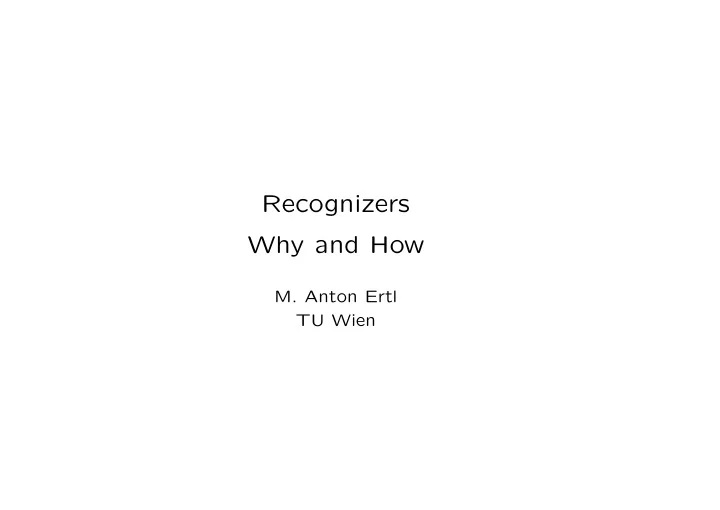

Recognizers Why and How M. Anton Ertl TU Wien
How to deal with literals Recognizers Parsing Words 123 s" abc" $ff H# ff ’a’ [char] a 1.2e3 • No way to define new recognizers • No good way to define parsing words non-default non-immediate compilation semantics State -smartness and the like Not just an implementation problem • ⇒ user-defined recognizers
Ideal • Recognized literal acts like a normal word • : 123 123 ; • Interpret Compile Postpone ? vs. ]] a 123 b [[ ]] a [[ 123 ]] literal b [[ ’ ? find find-name name>string ?
How to specify and implement recognizers • Specify interpret, compile, and postpone actions Advantage: Optimization possible Disadvantage: Bugs can hide, especially for postpone • Specify parse-time, run-time, and data-shifting actions interpret: parse-time run-time compile: parse-time shift ]] run-time [[ postpone: parse-time shift ]] shift ]] run-time [[ [[ • Define a temporary word Advantages: Allows ticking etc. Conceptual simplicity Disadvantage: Optimization?
Temporary words • Separate dictionary pointer (like ELF section) • Should be inlined if compiled. But how? • Becomes permanent if postpone d or ticked • Other permanent uses need explicit permanence • Recognized string as name? Decompiler name>string
Coding example : usingle ( c-addr u -- f ) 0. 2over >number 0= if drop 2drop 2drop false exit then drop drop rot rot [’] constant execute-parsing true ;
Inline when compiled • Require using an intelligent compile, Quite elegant But set-opt is unlikely to be standardized • Or specify parse-time and compile-time action For compilation, perform these actions In other cases, build the word
Performance with many recognizers • Linear search through recognizer stack? • Or fast pre-selection • Pre-selection may accept invalid strings but must not reject valid strings • prefix pre-selectors ⇒ trie • regexp pre-selectors ⇒ NFA/DFA
Conclusion • User-defined words are great! Let´s also allow user-defined recognizers • New implementation approach: Define temporary words How to inline? • Pre-Selectors for performance
Recommend
More recommend